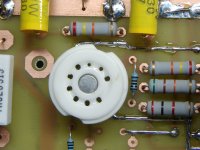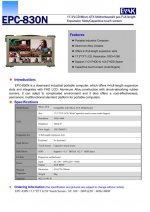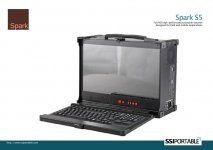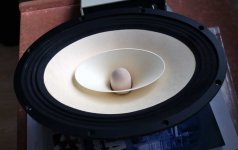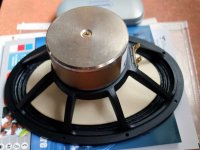All good points, VenusFly. I've only been burned once by the long shipping times, a seller played dumb about addressing something that came DOA. The fix is ridiculously simple, ebay should just force the claim window to be longer than the longer shipping estimate, it's all on computer for pete's sake.
I couldn't physically get the valves in the sockets
I finally fixed this one with a hammer......to get it out of the board and replace it. That taught me to try all sockets for fitment before soldering.
Attachments
Finally jumped on the dumbing down bandwagon and got myself a new Nokia smarty, the old one wasn't very "mobile" at all as I had to have it hooked up more or less permanently to the charger and was generally outdated and incompatible with current mobile apps, the other reason was to have a good camera with me when visiting the food shop so I can take pictures of the food products and check up what all the cryptic BS they put in are as I am struggling with a chronic illness which makes my daily life a minefield.
I read somewhere there should be a mobile app available with all E numbers, additives etc., got to check out where it's hiding on Google app store.
btw, I just made quick search and found a few interesting links, now I got to weed out which one to use...
E-Codes Free: Food Additives - Apps on Google Play
What's In My Food? 4 Free Apps That Demistify E-Numbers And Additives
E Numbers checking app for iPhone, Android and Windows Phone
I read somewhere there should be a mobile app available with all E numbers, additives etc., got to check out where it's hiding on Google app store.
btw, I just made quick search and found a few interesting links, now I got to weed out which one to use...
E-Codes Free: Food Additives - Apps on Google Play
What's In My Food? 4 Free Apps That Demistify E-Numbers And Additives
E Numbers checking app for iPhone, Android and Windows Phone
Last edited:
After the last two laptop computers I bought failed prematurely with neither big name manufacturer willing to actually support their product or honor their warantee, I have decided to build my own.
Happened to me too just some month ago, a few years old very little and lightly used Sony VAIO in pristine condition suddenly didn't want to work off mains supply, but the battery app software always indicated the battery was in "excellent condition", it also had a charging feature to charge the battery up to 80% and even 50% which prolongs the battery life a lot, and I have used the 50% setting like 90% of the time.
But no more mobility as it has to be connected to the charger for it to work and it dies instantly if I pull the charger plug.
Does anyone know what could have gone wrong, maybe some silicon somewhere in the PSU just got fried?
One of the necessary implements of building a laptop is a display screen. My preference was for a 17 inch screen. While searching the usual outlets I found a 15.6 inch screen with 4K resolution direct order from China. Would it arrive a week, a month, or a year? Would it work? And would my 65 year old eyes even be able to tell the difference between 1080 and 4K at this size? I ordered one to find out.....
Another big let down since day 1 I got this laptop is the LCD was of utter crap quality, I have never seen such a bad LCD and wouldn't have expected that from Sony mid-premium laptop model, anyway I actually thought very early on to change that LCD and did back then search eBay too and discovered there's a lot of replacement LCD's in various resolutions and sizes, I just never dared to take the risk.
I think I fooled myself due to having somewhere in my back head that Sony was related to in particular with "good picture quality" due to their renowned Trinitron CRT's, but was I wrong.
Some year ago I checked in closer on Sony's mobile phones but many of their premium mobile phones also got bad reviews in particular for their screens, it seems the new normal for Sony is to save on the screens!?
Although one of the must-have requirements I had back then when I acquired the laptop was a backlit keyboard (ie. the characters themselves are also backlit, not only around the keys) which many laptops still doesn't have, so the choice fell naturally on the Sony, backlit is a godsend when using it under dim light conditions.
All laptops these days are garbage. Even lenovo makes a poor attempt at a laptop but if I 'had' to I would get a Lenovo.
Second best tier on the crap scale is Asus but they lock down their bioses so hard its near impossible to install linux if you want to, which I don't.
This is why I refuse to buy another laptop and instead consider using mini pc's with actual keyboards instead.
Second best tier on the crap scale is Asus but they lock down their bioses so hard its near impossible to install linux if you want to, which I don't.
This is why I refuse to buy another laptop and instead consider using mini pc's with actual keyboards instead.
Last edited:
On your laptop battery issue, 2 thoughts
My old Dell had exactly the same issue, it was because it looked like a barrel connector, but had a 3rd conductor in the center. The plug had failed so that only the 2 barrel conductors made contact, but not the 3rd. The battery thus never charged, and if you pulled the plug, the laptop turned off on no power.
Also, you might be a victim of that dastardly chip that prevents the battery pack from working when the timer reaches 3 years. Google it.
My old Dell had exactly the same issue, it was because it looked like a barrel connector, but had a 3rd conductor in the center. The plug had failed so that only the 2 barrel conductors made contact, but not the 3rd. The battery thus never charged, and if you pulled the plug, the laptop turned off on no power.
Also, you might be a victim of that dastardly chip that prevents the battery pack from working when the timer reaches 3 years. Google it.
All laptops these days are garbage.
That is not true. I really like my MacBookPro, and the newer ones are even better.
dave
That sounds very plausible leadbelly, I have read upon the planned obsolescence stuff in the past and the first thing my stomach got a hunch of when my laptop suddenly failed was as if a timer just said "I am programmed to fail now" as it was so out of the blue, of the top of my head Samsung TV sets comes to my mind, placing electrolytes close to the heatsink so they fail prematurely.
I will check later that charger plug and open up the bottom cover to the battery compartment and measure the battery, I did this but can't recall now if I ever measured it.
btw got to back up my earlier post that, the battery was not only according the charging sw app, but also in real use it still had long discharge life, could use the computer for a few hours before it would give a low charge notification.
edit: from the little I know the laptop brands I think are the better choices are Acer, ASUS and Lenovo.
HP would probably be one of the very last choices and is also according to a local acquaintance who is servicing laptops and desktops the worst brand.
I will check later that charger plug and open up the bottom cover to the battery compartment and measure the battery, I did this but can't recall now if I ever measured it.
btw got to back up my earlier post that, the battery was not only according the charging sw app, but also in real use it still had long discharge life, could use the computer for a few hours before it would give a low charge notification.
edit: from the little I know the laptop brands I think are the better choices are Acer, ASUS and Lenovo.
HP would probably be one of the very last choices and is also according to a local acquaintance who is servicing laptops and desktops the worst brand.
Last edited:
I meant Windows laptops.
That has a lot to do with making them garbage :^)
dave
Unfortunately Windows is a necessity just because some of my most often used software needs it. Dual boot with a modern Linux flavor is a possibility too because writing code for a Windows box is nearly impossible these days. It has been a few years since I spent a lot of time on a Linux box. It ran open Suse 11.something.
I run Arta and many other “windows only” programs on both Linux and BSD (mac) based systems using a windows compatibility layer called Wine.
I’ve found that the more specialized the software and smaller the vendor, like speaker measurement tools (as opposed to Photoshop let’s say) the higher the likelihood they will run on Linux/Wine.
If it’s not bleeding edge / runs on an older code base it’s actually a huge asset in this case.
I’m guessing your software may fall into this category?
WineHQ - Run Windows applications on Linux, BSD, Solaris and macOS
Take a look if there’s others out there who have successfully run whatever software you are using on Wine.
Also, I’ve found found there’s generally excellent open source variants of most commercial software out there one might need if there isn’t an official Linux version.
As always there’s some exceptions, but they are getting fewer by the day.
Try Ubuntu if you are used to a Mac interface, try Mint if you are used to Windows.
You strike me as too actualized to continue buying the lie without a certain level of shame ;-)
On the subject of your laptop, I didn’t realize you were using desktop parts. Doesn’t apply in that case. For me, kind of defeats the purpose of a laptop if it can’t go on your lap.
If it were me I’d just go off the shelf and get a nice versatile case for whatever motherboard you are using.... Caselabs, Fractal Design, Lian Li etc. I have used some cases for multiple different builds, just gutting them when I want to upgrade. Some really nice ones are less than $100.
The NAS form factor cases are a great compromise. Ive also used tons of the more “plain Jane” Supermicro cases in my day and love them, along with the more beastly variants.
This to me is the 120W tube amp of computer chassis ;-) and you can rack mount it!
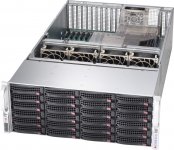
Last edited:
I run Arta and many other “windows only” programs on both Linux and BSD (mac) based systems using a windows compatibility layer called Wine.
My most used programs aren't the usual suspects. I use DAW software a lot (digital audio workstations). The most used is Ableton Live followed by Cakewalk Sonar. Live is Win / Mac and Sonar is Win only. Neither will run correctly in Wine. Live is reported to have issues in a Hackintosh. Both programs require direct access to the audio hardware so that you can play back several tracks while recording one or more new ones and everything stays in sync with low latency. An abstraction layer (Wine) between the native OS and the DAW screws up the timing. I also have some virtual guitar and amp simulators, again Windows only.
There is a native open source DAW for Linux and Windows, Ardour. I haven't tried it recently, so I can't say how far behind the mainstream DAWS it lags. The current mainstream versions have so many virtual instruments built into them that a lot of modern music doesn't even require musicians......just a "producer" or worse, a DJ. I just use it for a fancy digital tape recorder / editing station.
I also tend to use several engineering tools that run on Windows, but some are also available on Linux, or may run in an emulator. LT Spice runs in Wine on some computers, not on others, or so I'm told.
I still run all this stuff on W7, primarily because I have it, it works and so far doesn't screw up. Microsoft has ceased messing around with, excuse me, updating, W7 so it's stable and not likely to be broken by M$. I can't say that about W10. One of their "updates" broke the touch screen in the Asus laptop that I have.
to continue buying the lie without a certain level of shame ;-)
I know M$ for who they are. Several friends wound up there when Motorola closed down. Many have left already, others are not fond of the place.....Me, for now I will say I'm lazy. Why mess with something that works. I may try a modern Linux flavor on a spare machine when I have time to see how far the new tools have come. There are a lot of my day to day programs that will run on Linux, and some were actually written there, then ported to Win / MAC. The Arduino tools are a prime example, as are Blender and Ardour.
For me, kind of defeats the purpose of a laptop if it can’t go on your lap.
Most of the time I use it on a table. I do want it to be usable on my lap, so weight and heat from its bottom are the big concerns there. An extra inch or so of thickness isn't a deal breaker.
The NAS form factor cases are a great compromise.
All of my "dailly use" PC's are rack mount form factor from 2 RU to 4 RU. All use budget cases that were closeouts from Newegg, mainly iSTAR USA brand. I have a rather large 4 RU server case that will house a big tube amp......with a few more than 120 watts.
I think I've said it already but... when buying a laptop, I only get used Thinkpad from the T serie. A one year old laptop will be quite cheap and most come with a 3 year NBD onsite warranty by default. The few times I needed to contact them, the service has been excellent.
I have two HP laptops, one a very high end Elitebook I've owned for 20 months, and the other an entry level Pavilion convertible I've owned for about 6. (Both have great displays and touch screens.)
My last Dell ran fine for many thousands of hours and finally wore out after 8 years of hard use.
Both have W10 and I've had no issues with either the laptops or the OS.
My last Dell ran fine for many thousands of hours and finally wore out after 8 years of hard use.
Both have W10 and I've had no issues with either the laptops or the OS.
I have two HP laptops...I've had no issues with either the laptops or the OS.
Lets just say that I haven't bought an HP product since 2008 and will not!
Laptop #1 was an HP bought after previous HP products outlived their usefulness. 3 out of 2 HP Photojet 1000 printers died within months of purchase (90 day warantee) and the laptop never worked right.
It got so hot that you couldn't use it on your lap even with thick jeans. Their "software recall" turned the processor fan on full speed all the time so that the laptop sounded like a jet engine, battery life sucked, and it still got hot. A class action lawsuit ended with some users getting Acer laptops as replacements, which spurned more lawsuits, but no resolution.
The batteries were failing in spectacular fashion, but mine was "not covered " despite being on the list. I cut a hole in it stuck a big heatsink on the Nvidia chip which WAS overheating (brown PC board) and used it for a couple of years on AC power (120V inverter in a car). The heat had killed the battery. I wound up selling a $1K (2008 money) laptop for $50 in 2011.
The second is an ASUS core i7 laptop that came with W8 in 2014. Now upgraded to W10. At first they stated that I had voided the warantee by opening the unit up to install extra RAM. They caved on that one once the first year had expired. Despite stating "two year rapid replacement warantee" on the outside box, Asus will not honor the warantee since the serial number sticker on the bottom of the laptop says 12 months. I still have the box.
If left on a sturdy table and operated using a wireless keyboard / mouse it works fine, just don't use the touch screen. The plastic on the touchpad and outer shell are both slightly warped such that the mouse button on the touch pad is partly depressed. Any vibration or case flex causes random right or left button presses. Multiple attempts to shim, shave, or place foam in strategic places has helped, but the laptop is useless in a car or other mobile environment.
Customer service like this is why I have resorted to making my own PC's......and I don't use ASUS motherboards any more.
Oddly the printer and computer companies are now separate, but probably not back in 2008.. I am not a fan of HP printers, and have my own bad story with their customer service. (Cut myself on a plastic tab on an inkjet and had to have stitches, I called to complain and their rep laughed at me. I will never buy a new HP branded printer as a result) I have an Epson Workforce that works really well.
I had a mid range Elitebook at work for a number of years which prompted me to buy a high end Elitebook a couple of years ago, so far so good. I get about 6 - 8 hours of battery life and it runs very cool. It's equipped with a mobile i7 running at 3.9GHz and it's pretty fast, it was built to order.
The Pavilion is a low end model, but seems to work quite well.
I have an ASUS transformer pad (Android) which cost me over $700 back in 2012, it worked well for about a year, and since has been more and more erratic. (So bad I doubt I used it more than 100 hours) Two factory resets and rebuild with much fewer apps and I have given up on it. It will go to the local e-waste station at our DPW sometime in the next few weeks. It's definitely a piece of doodoo... Conversely I have a Samsung Galaxy Tab S2 that is now several years old, and I remain impressed with it.
I had a mid range Elitebook at work for a number of years which prompted me to buy a high end Elitebook a couple of years ago, so far so good. I get about 6 - 8 hours of battery life and it runs very cool. It's equipped with a mobile i7 running at 3.9GHz and it's pretty fast, it was built to order.
The Pavilion is a low end model, but seems to work quite well.
I have an ASUS transformer pad (Android) which cost me over $700 back in 2012, it worked well for about a year, and since has been more and more erratic. (So bad I doubt I used it more than 100 hours) Two factory resets and rebuild with much fewer apps and I have given up on it. It will go to the local e-waste station at our DPW sometime in the next few weeks. It's definitely a piece of doodoo... Conversely I have a Samsung Galaxy Tab S2 that is now several years old, and I remain impressed with it.
That has a lot to do with making them garbage :^)
No it doesn't.
Customer service like this is why I have resorted to making my own PC's......and I don't use ASUS motherboards any more.
Me either. Even the supposed indestructible Gigabyte mobos have failed on me, twice now so far.
The only motherboard I've owned so far which hasn't failed yet is an intel branded one.
I applaud you and your decision to make your own laptop. I am opposed to buying yet another laptop mainly because I will go through a keyboard and mouse every 3 years or so through either fraying of the usb cable or just plain wearing them out.
I couldn't imagine the cost of owning a laptop long term which already starts out with a poor performing cpu and a single display that I cannot ever change or replace if it dies and if I ever drop the laptop I'm never going to be able to justify buying a replacement. Laptops are quite seriously too costly to own and operate and replace if they are dropped or damaged. Not to mention the restricted BIOSes and other OEM quirks.
And if you want good build quality you have to spend thousands on one or get second hand thinkpad or toughbook. I don't like the idea of my keyboard flexing under the weight of my fingers, it makes the gadget that I'm using feel like a toy. Feeling like a toy really sums up modern laptops in one word.
And of course a laptop is just a single spilt drink away from disaster or a broken motherboard connector (when upgrading ram or changing a hard drive).
You also wouldn't believe how easy it is to damage a laptop screen when you are throwing it around and using it portable. One scratch or scrape or drop and its done for. Even the cheapest desktop monitors have at least some drop resistance because they have a steel backplate inside of them.
And as mentioned above lets not mention the fragility of the power connectors on laptops, they are not able to withstand the 5-10 year lifespan which is common these days of desktop pc upgrade cycles.
The whole idea of a laptop, that is portable computing power, is really quite unnecessary and expensive for most people who just want to browse the web and watch youtube videos, miniITX pc's have evolved so well that there is very little need for a laptop anymore.
Desktop or even miniITX pc's are far more resilient and for casual portable computer use a miniITX based pc is far more easier to setup in a car than it used to be. You used to have to have a large desktop pc in a car if you wanted pc operation, not anymore. Now you can quite literally setup an itx pc the size of a cd in the palm of your hand and have it attached to the back of a monitor with a replacable mouse and keyboard as usb as an alternative to casual portable computing use.
Just look at the wide array of ITX compatible cases for sale today and you will really wonder why people are still using laptops for most casual portable pc use.
The only downside to going down this route is that in a desktop cpu platform you do not have access to the ultra low voltage cpu ranges, which can create some sizeable battery lifespan savings but that is easily fixed by simply using a larger battery.
I'm surprised that there hasn't been an attempt at creating a universal laptop platform whereby components are standardized and the ITX formfactor is implemented for a motherboard, replacable monitor, keyboard, mouse, battery, etc.
I'm 100% sure that an itx case manufacturer could do it by simply attaching an itx case to the back of a monitor in a moderatley 1 inch deep box made from steel or aluminum with a small psu built in. There is really no need for a battery, that is a luxury.
There was an attempt nearly 20 years ago to make a laptop that you could build your own using a s478 or socket a cpu but that was a far cry from a fully modular laptop.
I think the best analog for what you are trying to achieve would be the old "luggable" laptops of the 80s and 90s. Such as the IBM 8573-121.
IBM Model 8573-121 - Computing History
I can see why you chose to use a briefcase. But surely version 2 of your design can rely on bending and bolting steel bits together to get some kind of shielding and design going on?
Portable lunchbox computers as an alternative to High end Laptops | NotebookReview
Thats what I'm thinking if I wanted to build one.
Attachments
Last edited:
Collected some speakers from the local "post"office today.
There was a pair of Sonido 6,5" fullrange drivers that a friend had ordered and a pair of very interesting and intriguing elliptically shaped 6" by 9" FR drivers also from Sonido.
There was a pair of Sonido 6,5" fullrange drivers that a friend had ordered and a pair of very interesting and intriguing elliptically shaped 6" by 9" FR drivers also from Sonido.
Attachments
- Home
- Member Areas
- The Lounge
- And what did we buy today?
